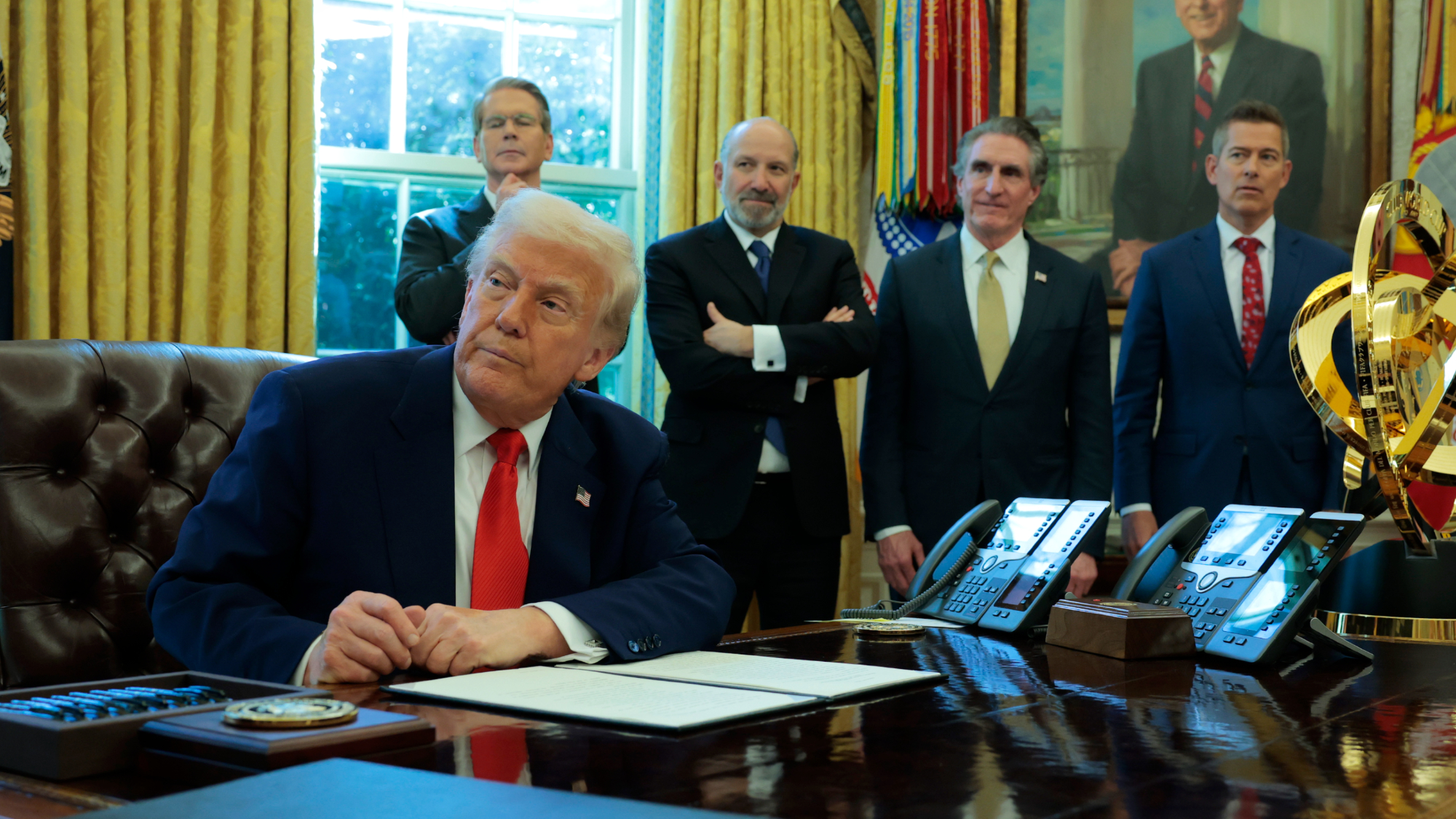Trump pauses some tariffs but ramps up China tax
The president suspended most 'reciprocal' tariffs for 90 days and raised his tariffs for China to 125%


A free daily email with the biggest news stories of the day – and the best features from TheWeek.com
You are now subscribed
Your newsletter sign-up was successful
What happened
President Donald Trump reversed course Wednesday, suspending most "reciprocal" tariffs 13 hours after they took effect but keeping the 10% tax on almost all imported goods and raising his tariffs for China to 125%. Trump's announcement of a 90-day pause led to a rally in slumping markets, erasing some of the huge losses since he announced his steep tariffs April 2.
Who said what
Trump's "stunning reversal" followed days of insistence that his "historically high tariffs were here to stay," said CNN. "Be cool!" Trump said on social media Wednesday morning, followed shortly by: "This is a great time to buy!"
The White House "tried to characterize" Trump's "jarring" U-turn as "part of a grand negotiating strategy," The Associated Press said, but to anyone "outside the Trump administration, it looked like a cave-in to market pressure." Treasury Secretary Scott Bessent told reporters that Trump's about-face "was his strategy all along." But shortly afterward, Trump said he had acted after people were "getting a little bit yippy, a little bit afraid."
The Week
Escape your echo chamber. Get the facts behind the news, plus analysis from multiple perspectives.

Sign up for The Week's Free Newsletters
From our morning news briefing to a weekly Good News Newsletter, get the best of The Week delivered directly to your inbox.
From our morning news briefing to a weekly Good News Newsletter, get the best of The Week delivered directly to your inbox.
"Ultimately, Trump caved to the bond markets," Heather Long said at The Washington Post. The sharp selloff of U.S. Treasuries signaled that investors no longer see the U.S. as "rock solid," as it's "impossible to make sense of what Trump is doing." The "simultaneous decline in equities, bonds" and the U.S. dollar showed the market had "switched to a 'sell everything American' mode reminiscent of what sometimes happens to emerging economies," The Wall Street Journal said. And Trump's "sudden reversal doesn't mean all the damage will be quickly undone."
What next?
The 90-day pause "triggered a powerful stock market rally," but there are signs it won't last, the AP said, and "businesses, investors and America's trading partners" remain "bewildered" and unable to plan for the future. Trump's import taxes are still the highest in decades, his future plans are unclear, and China's foreign ministry said this morning it "won't back down" in the escalating trade war.
A free daily email with the biggest news stories of the day – and the best features from TheWeek.com
Rafi Schwartz has worked as a politics writer at The Week since 2022, where he covers elections, Congress and the White House. He was previously a contributing writer with Mic focusing largely on politics, a senior writer with Splinter News, a staff writer for Fusion's news lab, and the managing editor of Heeb Magazine, a Jewish life and culture publication. Rafi's work has appeared in Rolling Stone, GOOD and The Forward, among others.
-
 The 8 best TV shows of the 1960s
The 8 best TV shows of the 1960sThe standout shows of this decade take viewers from outer space to the Wild West
-
 Microdramas are booming
Microdramas are boomingUnder the radar Scroll to watch a whole movie
-
 The Olympic timekeepers keeping the Games on track
The Olympic timekeepers keeping the Games on trackUnder the Radar Swiss watchmaking giant Omega has been at the finish line of every Olympic Games for nearly 100 years
-
 Judge orders Washington slavery exhibit restored
Judge orders Washington slavery exhibit restoredSpeed Read The Trump administration took down displays about slavery at the President’s House Site in Philadelphia
-
 Kurt Olsen: Trump’s ‘Stop the Steal’ lawyer playing a major White House role
Kurt Olsen: Trump’s ‘Stop the Steal’ lawyer playing a major White House roleIn the Spotlight Olsen reportedly has access to significant US intelligence
-
 Hyatt chair joins growing list of Epstein files losers
Hyatt chair joins growing list of Epstein files losersSpeed Read Thomas Pritzker stepped down as executive chair of the Hyatt Hotels Corporation over his ties with Jeffrey Epstein and Ghislaine Maxwell
-
 Judge blocks Hegseth from punishing Kelly over video
Judge blocks Hegseth from punishing Kelly over videoSpeed Read Defense Secretary Pete Hegseth pushed for the senator to be demoted over a video in which he reminds military officials they should refuse illegal orders
-
 Trump’s EPA kills legal basis for federal climate policy
Trump’s EPA kills legal basis for federal climate policySpeed Read The government’s authority to regulate several planet-warming pollutants has been repealed
-
 House votes to end Trump’s Canada tariffs
House votes to end Trump’s Canada tariffsSpeed Read Six Republicans joined with Democrats to repeal the president’s tariffs
-
 Bondi, Democrats clash over Epstein in hearing
Bondi, Democrats clash over Epstein in hearingSpeed Read Attorney General Pam Bondi ignored survivors of convicted sex offender Jeffrey Epstein and demanded that Democrats apologize to Trump
-
 El Paso airspace closure tied to FAA-Pentagon standoff
El Paso airspace closure tied to FAA-Pentagon standoffSpeed Read The closure in the Texas border city stemmed from disagreements between the Federal Aviation Administration and Pentagon officials over drone-related tests
